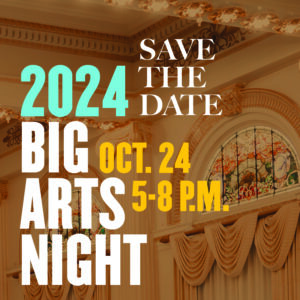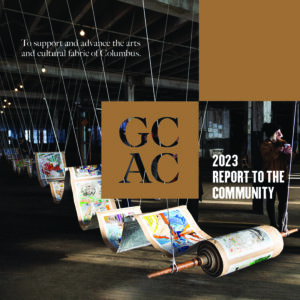COLUMBUS, Ohio—The Greater Columbus Arts Council (GCAC) announced its ticket fee proposal based on community feedback.
GCAC proposes a 7 percent fee to be applied to admissions and tickets to arts, culture, entertainment (for-profit and nonprofit) and professional sports in the city of Columbus.
“Our nonprofit arts and culture sector generate nearly half a billion in economic activity annually, support 15,000 jobs, and add immensely to our quality of life, and the arena adds significant economic impact on top of that,” said Tom Katzenmeyer, President and CEO of the Greater Columbus Arts Council. “But our cultural facilities and the arena are at a tipping point. If we don’t secure an additional $15 million annually, we are at risk of thwarting the significant economic impact of our arts and culture sector, including losing jobs, and reducing the important investment in education and outreach efforts by our cultural organizations. Additionally, the city’s efforts to attract and retain business, talented workers and tourism will be severely hampered. That’s simply too much for Columbus to risk.”
A recent series of public forums held by the Greater Columbus Arts Council on the proposed fee gathered feedback from the community and resulted in GCAC including a number of key definitions and two key exemption recommendations in the proposal:
- If the event occurs at a live performance or event venue of 400 seats or less, the fee shall not be applied.
- If the event price at a live performance or event venue falls at or below $10, the fee shall not be applied.
“These proposed changes would exempt a number of live events around the city, children’s tickets in most cases, as well as non-ticketed and smaller cash-based cover charges,” Katzenmeyer said. “Our goal was to reduce or eliminate the administrative burden on smaller businesses, organizations and projects. We also hope that these recommendations would encourage advance ticket sales where the advance price is $10 and under. “
“We understand these exemption recommendations would result in a loss of proceeds from admissions,” said Katzenmeyer. “But we listened to the community and we know this is the right thing to do.”
Fifteen years of research and more than 30 studies indicate that nonprofit arts and culture in Columbus is far underfunded publicly compared to peer cities. Research also indicates that due to the arena having no significant capital improvements in its 19-year history, it is near the bottom of the list of its competitors nationwide in spending on renovations.
Seventy percent of the proceeds from the ticket fee would benefit small and large cultural organizations, festivals, arts and cultural events and programs, grants for artists and invest much needed funds in cultural facilities’ capital needs. The remaining 30 percent of funds will be distributed to Nationwide Arena for capital expenditures.
“With professional sports and performances at Nationwide Arena alone generating more than 35 percent of the annual estimated admissions revenue each year the arena will be a net contributor to the arts and cultural sector under this proposal,” said Katzenmeyer.
Additional definitions and recommendations include:
- Events the Arts Council recommends not including in the definition of ticket or admission: Race and walk registrations; registration fees for classes, lectures, workshops, camps, culinary, brewery, distillery and cultural tours and tastings; complimentary tickets; free events; pay what you can event access; charges outside of admission incurred in the process of producing or attending an event (vendor space rental, parking, food, beverages, rides); charitable events solely benefiting the operations of a nonprofit organization*; memberships which are not attached to admission to an event or venue (shopping clubs, service organizations, maker-spaces); benefits beyond the value of admissions or tickets (space rental, complimentary tickets, reciprocal memberships, catalogs); lane fees at bowling alleys; admissions or fees for animals entering an event or venue. *Events in which only partial proceeds benefit a nonprofit organization and the remainder go to a for-profit entity would have to apply the fee.
- Memberships, season tickets and subscription series: Attractions would apply the fee to the value of a one-time admittance for the number of individuals covered by the membership. Performing arts and sports would apply the fee to the total purchase price of the tickets within the season or subscription. For organizations operating venues outside the city of Columbus, the fee shall be applied only on memberships purchased at the Columbus venues.
- Requirement for GCAC Operating Support Grantees: In order to receive an Operating Support grant from GCAC, organizations with, or using venues of 400 seats or less, or holding events charging $10 or less for a ticket, must voluntarily apply the 7 percent fee.
- Exemptions currently understood to be in place under Ohio law and previously stipulated by other municipalities: All K-12 sporting events and college sporting events, at any venue; admissions to events for the exclusive benefit of: religious institutions, persons in U.S. military forces, Columbus Public Schools, Columbus Police, Columbus Fire, City of Columbus, State of Ohio, or any political subdivision.
Additionally, the Greater Columbus Arts Council recommended that they, and the Franklin County Convention Facilities Authority, be required to publicly report annually on how the proceeds from the ticket fee were invested in the community and in the arena.
Currently, 64 Ohio cities have ticket fees, as do many cities across the country that Columbus competes with for business and tourism.
The full proposal will be available online at: https://www.gcac.org/impact-of-the-arts/columbus-ticket-fee-proposal/ at 6 p.m. Sept. 17.
About the Greater Columbus Arts Council: Through vision and leadership, advocacy and collaboration, the Greater Columbus Arts Council supports art and advances the culture of the region. A catalyst for excellence and innovation, the Arts Council funds exemplary artists and arts organizations and provides programs, events and services of public value that educate and engage all audiences in our community. The Arts Council is supported by the city of Columbus, the Ohio Arts Council, and individuals and businesses throughout the community. www.gcac.org
###
CONTACT: Jami Goldstein
(614) 221-8492
jgoldstein@gcac.org





